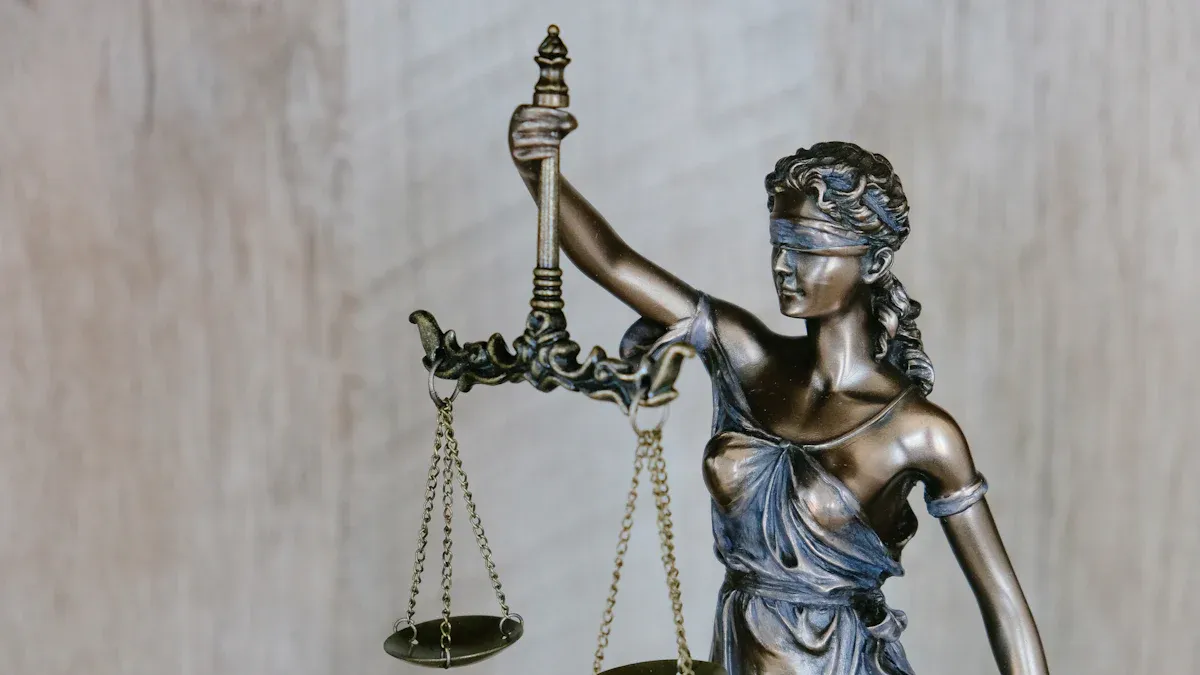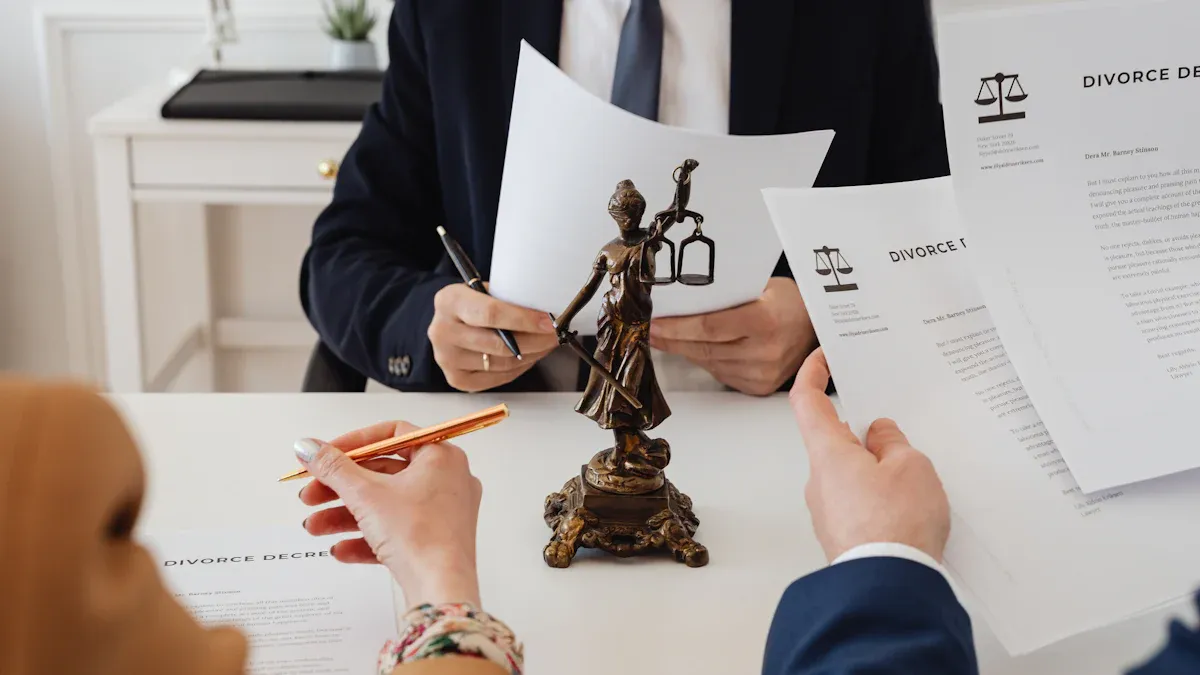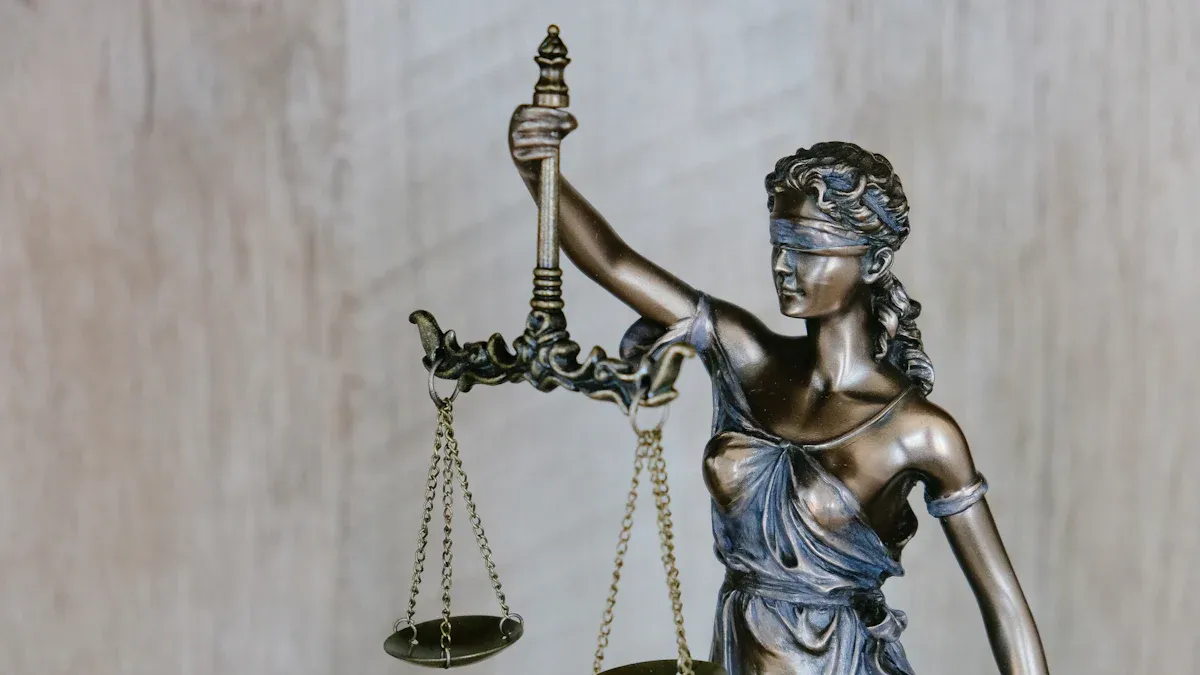Image Source: unsplash
Navigating personal injury law without expert guidance can feel overwhelming. You may face challenges like emotional strain, financial stress, or confusion about legal procedures. Calculating fair compensation or determining shared liability often requires specialized knowledge. In our ‘Expert Interview: Key Strategies Behind Successful Personal Injury Cases,’ we explore how expert strategies simplify these complexities, helping you focus on recovery while maximizing your case’s potential for success.
Key Takeaways
- Take action fast after getting hurt to save evidence. Acting quickly also helps you meet legal deadlines.
- Pick a lawyer who knows personal injury law well. Their knowledge and good communication can help your case a lot.
- Don’t settle your case too soon. Fast deals often pay less and may cause money problems later.
Understanding the Basics of Personal Injury Cases
Key Components: Negligence, Causation, and Damages
To succeed in a personal injury case, you must understand its three key components: negligence, causation, and damages. Negligence occurs when someone fails to act with reasonable care. For example, running a red light and causing an accident demonstrates negligence. Causation links the negligent act to your injuries. You must prove that the other party’s actions directly caused harm. Finally, damages refer to the financial compensation you can claim for your injuries, such as medical bills or lost wages. Each of these elements must be clearly established to build a strong case.
What Makes a Case Viable
Not every personal injury claim leads to success. Several factors determine whether your case is viable. Strong evidence, such as photographs, medical records, and witness statements, plays a critical role. The severity of your injuries also impacts the potential compensation. Clear liability must be established to prove who is at fault. Additionally, your actions after the incident, like seeking medical attention or documenting the event, can influence the case’s outcome. Working with an experienced attorney ensures you navigate these factors effectively and maximize your chances of success.
Common Types of Personal Injury Cases
Personal injury cases cover a wide range of incidents. Some of the most common include car accidents, pedestrian accidents, and workplace injuries. Slip and fall accidents often occur due to unsafe conditions on someone else’s property. Medical malpractice cases arise when healthcare providers fail to meet professional standards, causing harm. Other examples include product liability, dog bites, and nursing home abuse. Understanding the type of case you have helps you focus on the specific evidence and legal strategies needed for success.
Building a Strong Case

Image Source: pexels
Evidence Collection and Documentation
Collecting and organizing evidence is the foundation of a strong personal injury case. You must act quickly to gather all relevant materials before they are lost or forgotten. Start by categorizing and labeling each piece of evidence for easy access. Create folders or digital files for items like medical records, witness statements, and photographs. This organization ensures clarity during legal proceedings.
To strengthen your case, focus on these best practices:
- Gather medical documentation, including reports and prescriptions, to link your injuries to the incident.
- Secure eyewitness accounts by obtaining contact details and written or recorded statements.
- Take photos or videos of the accident scene, injuries, and property damage. These visuals provide compelling proof.
- Maintain detailed records of all evidence, noting dates and descriptions.
Proper handling of evidence is crucial. Store physical items securely to prevent tampering. Back up digital files and follow chain-of-custody guidelines. These steps ensure your evidence remains credible and admissible in court.
Acting Within Statutes of Limitations
Every state has a deadline for filing personal injury claims, known as the statute of limitations. Missing this deadline can result in losing your right to compensation. For example, states like Alabama, Alaska, and California have a two-year limit, while Arkansas allows three years.
| State | Injury Statute |
|---|---|
| Alabama | 2 years |
| Alaska | 2 years |
| Arizona | 2 years |
| Arkansas | 3 years |
| California | 2 years |
| Colorado | 2 years |
| Connecticut | 2 years |
Act promptly to protect your claim. Consult an attorney early to confirm your state’s deadline and avoid unnecessary delays.
Role of Expert Witnesses
Expert witnesses can significantly enhance your case. Their specialized knowledge helps clarify complex details for judges and juries. For instance, they can analyze the accident to establish causation or assess damages to highlight both immediate and long-term costs. Their testimony adds credibility, making your claims more persuasive.
Studies reveal that cases involving expert witnesses are 86% more likely to result in favorable outcomes. These professionals also play a key role in negotiations, ensuring fair settlements. By including expert witnesses, you increase your chances of success and maximize compensation.
The Role of Legal Representation
Traits of Effective Attorneys
Choosing the right attorney can make or break your personal injury case. Effective attorneys share several key traits that set them apart. First, they specialize in personal injury law, ensuring they understand the nuances of your case. Second, they have a proven track record of successful settlements and verdicts. Reviewing their past results gives you confidence in their ability to deliver. Third, they excel in communication. A skilled lawyer keeps you informed, answers your questions, and provides clear guidance throughout the process.
When you work with an attorney who embodies these traits, you gain a partner who is committed to your success. Their expertise and dedication can significantly improve your chances of achieving a favorable outcome.
How Attorneys Impact Case Outcomes
An experienced attorney doesn’t just represent you—they actively shape the outcome of your case. They know how to negotiate with insurance companies to secure fair compensation. Their understanding of legal procedures ensures that your case is filed correctly and within deadlines. Attorneys also anticipate challenges, preparing strategies to counter them effectively.
In court, their ability to present evidence and argue persuasively can sway the judge or jury in your favor. Studies show that plaintiffs with legal representation often receive higher settlements than those who go it alone. By hiring a skilled attorney, you level the playing field and maximize your chances of success.
Selecting the Right Legal Team
Finding the right legal team requires careful consideration. Start by asking for personal referrals or researching online directories. Define your criteria, such as the attorney’s experience with cases like yours and their availability to take on your case. Create a shortlist of potential candidates and assess their credentials, track record, and client testimonials.
Pay attention to how they handle case fees and whether their approach aligns with your settlement goals. A good attorney should not only have the expertise but also make you feel confident and supported. Taking the time to select the right legal team ensures you have the best possible representation for your personal injury case.
Strategic Approaches to Success

Image Source: unsplash
Negotiation Tactics
Negotiation plays a pivotal role in personal injury cases. To secure the best outcome, you need to approach negotiations with a clear strategy. Start by preparing thoroughly. Research the details of your case and understand the other party’s priorities. Building rapport is equally important. Show empathy and listen actively to establish trust. This can make the other side more willing to cooperate.
When presenting your case, use logical arguments supported by evidence. Combine this with emotional appeals to highlight the impact of the injury on your life. Be ready to compromise by identifying trade-offs that benefit both sides. However, stay firm on critical issues and remain calm during difficult discussions. If negotiations stall, don’t hesitate to walk away. Sometimes, this signals your seriousness and prompts better offers.
Litigation Readiness
Preparing for litigation ensures you’re ready if negotiations fail. Start by gathering all relevant evidence, such as photos, medical records, and witness statements. Store this information securely, using tools like cloud storage or physical files. Analyze the evidence carefully to identify strengths and weaknesses in your case. This preparation helps you and your attorney build a compelling argument.
| Step | Description | Tools |
|---|---|---|
| Gathering Evidence | Collecting and documenting information post-accident. | Cameras, witness forms |
| Storing Evidence | Keeping evidence secure and easily retrievable. | Secure clouds, databases |
| Analyzing Evidence | Reviewing data to support your claims. | Legal software, experts |
By following these steps, you’ll feel confident and prepared to face any challenges in court.
Maximizing Compensation
Maximizing your compensation requires a proactive approach. Seek medical attention immediately after the accident to establish a clear link between your injuries and the incident. Document all damages, including medical bills, lost wages, and emotional distress. This creates a strong foundation for your claim.
Avoid accepting quick settlements from insurance companies. They often offer lower amounts initially. Instead, negotiate effectively by presenting a detailed demand letter. Include all evidence and a breakdown of damages. Be prepared to counter low offers with facts and persistence. Hiring a skilled personal injury attorney also boosts your chances of securing the compensation you deserve. Their expertise ensures your case is presented in the strongest possible light.
By combining these strategies, you can navigate your case confidently and achieve the best possible outcome.
Avoiding Common Pitfalls
Premature Settlements
Settling your personal injury case too early can lead to significant financial and legal risks. Insurance companies often pressure you to accept quick settlements, offering amounts far below what your claim is worth. While it may seem tempting to resolve the case quickly, rushing into an agreement can harm your long-term interests.
Here’s why premature settlements can be problematic:
- Underestimating Long-Term Damages: Early settlements may overlook future medical needs or lost earning potential.
- Overlooking Hidden Damages: Emotional distress and loss of enjoyment of life are often ignored in quick offers.
- Insufficient Evidence Gathering: Settling early may prevent you from collecting critical evidence to strengthen your case.
- Waiver of Future Claims: Once you accept a settlement, you cannot pursue additional compensation later.
To avoid these pitfalls, consult an experienced attorney before agreeing to any settlement. They can help you evaluate the true value of your claim and negotiate a fair outcome.
Social Media Mistakes
Your social media activity can significantly impact your personal injury case. Insurance companies and opposing attorneys often monitor your posts to find evidence that contradicts your claims. Even innocent updates can be misinterpreted and used against you.
Common social media mistakes include:
- Posting photos or videos of physical activities that contradict your injury claims.
- Making statements about the accident that could be seen as admitting fault.
- Sharing content that portrays you in a negative light, such as reckless behavior.
To protect your case, avoid posting about your accident or injuries. Adjust your privacy settings and think carefully before sharing anything online. When in doubt, consult your attorney for guidance on managing your social media presence.
Communication Errors with Insurance Companies
Speaking with insurance companies without proper preparation can jeopardize your case. Adjusters are trained to minimize payouts, and casual remarks can be used against you.
Here are common communication errors to avoid:
- Talking to adjusters without consulting your attorney.
- Downplaying your injuries, which weakens your claim.
- Making offhand comments that could be misinterpreted.
Always approach these conversations cautiously. Let your attorney handle communications to ensure your rights are protected and your case remains strong. By avoiding these errors, you can maintain control over your claim and secure the compensation you deserve.
Expert Insights and Final Thoughts
Key Takeaways from Experts
Experts emphasize several critical strategies for success in personal injury cases:
- Timely Action Matters: Acting quickly after an injury ensures evidence is preserved and deadlines are met.
- Selecting the Right Attorney: Choose a lawyer with expertise in personal injury law, a proven track record, and excellent communication skills.
- Negotiation vs. Litigation: Most cases settle out of court. Strong negotiation skills often lead to fair compensation without the need for a trial.
- Maximizing Compensation: Consider all damages, including medical bills, lost wages, and emotional distress. Expert opinions can strengthen your claim.
- Avoiding Common Pitfalls: Avoid premature settlements and be cautious about social media activity that could harm your case.
By following these expert recommendations, you can position yourself for a favorable outcome.
Actionable Advice for Plaintiffs
To strengthen your case, take proactive steps immediately after the incident. Document everything, from medical visits to accident details. Seek legal counsel early to avoid costly mistakes. When negotiating, remain patient and persistent. Present a detailed breakdown of your damages and back it up with evidence.
Tip: Avoid discussing your case on social media. Even innocent posts can be misinterpreted and used against you.
Remember, your actions directly impact the success of your claim. Stay informed and work closely with your attorney to navigate the process effectively.
Importance of Professional Guidance
Professional guidance is invaluable in personal injury cases. Specialized attorneys analyze complex legal situations and handle negotiations, allowing you to focus on recovery. Their expertise ensures that every aspect of your case, from documentation to court representation, is managed effectively.
Without professional support, you risk missing critical details that could affect your compensation.
Hiring an experienced legal team increases your chances of achieving justice and securing fair compensation. Trusting experts to guide you through the process is one of the smartest decisions you can make.
Expert strategies are the cornerstone of successful personal injury cases. They help you assess your claim’s value, navigate legal complexities, and protect your interests during negotiations. Hiring an experienced attorney ensures you have expert legal knowledge on your side. Their guidance strengthens your case, maximizes compensation, and allows you to focus on recovery.
Don’t leave your future to chance. Seek professional legal advice today to secure the justice and compensation you deserve.
FAQ
What should you do immediately after a personal injury accident?
You should document the scene, gather evidence, and seek medical attention. These steps strengthen your case and ensure your injuries are properly recorded.
How can you calculate the value of your personal injury claim?
Consider medical bills, lost wages, and emotional distress. Consulting an attorney ensures you include all damages and maximize your compensation.
Why is hiring a personal injury attorney important?
An attorney protects your rights, negotiates with insurance companies, and builds a strong case. Their expertise increases your chances of receiving fair compensation.




